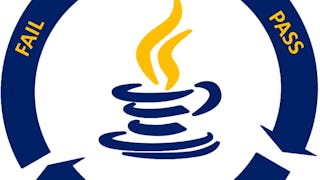Unlock reliable Java testing with our "Introduction to JUnit" course. Designed for students, junior developers, and QA testers who want to improve code quality and confidence, this course provides the essential foundations and practical tools of unit testing using JUnit 4 and JUnit 5. From understanding why unit tests matter to setting up JUnit, organizing tests, and integrating with build and CI tools, you’ll gain the skills to deliver maintainable, bug-resistant software.

5 days left: Discover new skills with 30% off courses from industry experts. Save now.


Recommended experience
What you'll learn
Explain unit testing principles and JUnit fundamentals.
Apply assertions, exception testing, and setup/teardown to validate behavior.
Implement parameterized tests, tagging/suites, and run tests in IDEs, Maven/Gradle, and CI.
Translate requirements into clear, maintainable test cases using mocks and fluent assertions.
Skills you'll gain
Details to know

Add to your LinkedIn profile
April 2025
11 assignments
See how employees at top companies are mastering in-demand skills

There are 3 modules in this course
In the Java Fundamentals module, you will be introduced to the Java programming language, one of the most popular programming languages used for developing a wide range of applications. You will learn about the core components of the Java platform, including the Java Virtual Machine (JVM) and the Java class library.
What's included
12 videos4 readings2 assignments
The Core Java module is a comprehensive training program that covers the fundamental concepts of the Java programming language. This module provides a deep understanding of Java programming and its key components. In this module, participants will learn about the essential concepts such as Java Syntax, Variables and Methods, Operators, & Control Statements. Throughout the module, participants will work on several assessments to reinforce their learning and improve their problem-solving skills. By the end of this module, participants will have a strong foundation in Core Java and be able to apply their knowledge to create robust and efficient Java applications.
What's included
29 videos3 readings4 assignments
This module is designed to provide participants with an in-depth understanding of advanced object-oriented programming (OOP) principles and other essential concepts in Java programming. In this module, participants will learn about advanced OOP concepts such as inheritance, polymorphism, and encapsulation, and how to apply them to create efficient and reusable code. Participants will also learn about extension methods, interfaces, and abstract classes, which are advanced techniques used to manage classes and objects in Java. Furthermore, participants will gain an understanding of advanced topics in exception handling, such as creating custom exceptions and handling multiple exceptions, which are critical to improving the reliability and robustness of their code. Throughout the module, participants will work on several hands-on projects to reinforce their learning and improve their problem-solving skills. By the end of this module, participants will be able to apply their knowledge of advanced OOP concepts and essential Java programming concepts to develop efficient, scalable, and maintainable Java applications.
What's included
31 videos6 readings5 assignments
Instructor

Offered by
Explore more from Software Development
 Status: Free Trial
Status: Free TrialBoard Infinity
 Status: Free Trial
Status: Free TrialLearnQuest
 Status: Free Trial
Status: Free TrialLearnQuest
Why people choose Coursera for their career





Open new doors with Coursera Plus
Unlimited access to 10,000+ world-class courses, hands-on projects, and job-ready certificate programs - all included in your subscription
Advance your career with an online degree
Earn a degree from world-class universities - 100% online
Join over 3,400 global companies that choose Coursera for Business
Upskill your employees to excel in the digital economy
Frequently asked questions
The course is designed to introduce the Java programming language to beginners. It covers the basics of Java, including syntax, data types, and operators. The course dives deeper into exception handling, file I/O, working with arrays, and object-oriented programming concepts. It also covers advanced topics like interfaces, abstract classes, encapsulation, multi-threading, concurrency, and commonly used data structures in Java.
This course is designed for those who are completely new to Java programming and want to develop a strong foundation in it. However, anyone interested in improving their Java programming skills can benefit from this course.
In the Java Fundamentals module, you will be introduced to the Java programming language and learn about its core components including the Java Virtual Machine (JVM) and the Java class library. You will also learn about the language's syntax, data types, and operators.
More questions
Financial aid available,



